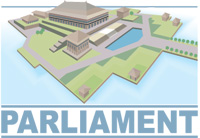Columns
After much protests by Opposition over delays, 2nd reading of Anti Corruption Bill passed without a vote
 The Second Reading of the Anti-Corruption Bill was passed in Parliament without a vote on Thursday (6) after the opposition protested a proposal by the government to further postpone the bill. The Committee Stage, where amendments will be incorporated into the final draft, was postponed for July 19.
The Second Reading of the Anti-Corruption Bill was passed in Parliament without a vote on Thursday (6) after the opposition protested a proposal by the government to further postpone the bill. The Committee Stage, where amendments will be incorporated into the final draft, was postponed for July 19.
Leader of the House Minister Susil Premajayantha initially proposed that approving the bill be postponed, but was met by vocal protests from the opposition.
Chief Opposition Whip Lakshman insisted that the bill be passed that day, with amendments being introduced at the Committee Stage thereafter. “How many days did we spend on this? We held five Parliamentary Group meetings. We discussed this with experts. Now they are talking about yet another delay.”
Mr Kiriella blamed the government for introducing draft bills that were riddled with mistakes.
There are 28 pages worth of amendments suggested for the final draft. The Supreme Court alone has suggested 34 amendments. “We don’t want to delay this indefinitely. We can finish this during the Committee Stage debate on July 19,” said Minister Premajayantha.
Approving the bill has already been postponed twice, noted Opposition Leader Sajith Premadasa. “The Honourable Justice Minister has spent hours with us in the various committees going through all the amendments, so the work is done.” Mr Premadasa then asked Justice Minister Wijeyadasa Rajapakshe to explain why approving the bill is being delayed for a third day.
It took the government more than 10 months to get the bill ready, said Minister Rajapakshe. “I put more effort into this than the 21st Amendment to the Constitution,” he stressed. “From my side, I don’t know the reason for this bill to be delayed.”
Mr Premadasa noted that the Leader of the House is saying one thing while the Justice Minister is saying another. He asked how the Leader of the House can override the Justice Minister.
Mr Premajayantha then said the government was willing to pass the Second Reading of the bill without a vote that day while the Committee Stage will be postponed to July 19.
Earlier in the day, Mr Premadasa told the House that while the bill is an improvement on previous anti-corruption legislation, serious questions arise as to whether the steps that the government is taking are enough.
The government should have introduced the Anti-Corruption Bill as soon as it came to power. The only reason the government is doing it now is because the International Monetary Fund (IMF) has imposed it as a condition, Mr Premadasa noted. The opposition has proposed many amendments to the draft, of which the government has accepted about 75 percent. The 25 percent it has rejected though, contain many of the most important amendments, he claimed.
Among the rejected amendments is one to give retrospective effect to the bill, an amendment on recovery of stolen assets and several amendments regarding a proper procedure on withdrawing indictments, according to the Opposition Leader. He claimed a future SJB government would introduce more stringent anti-corruption laws that include these clauses.
“Whether it is the IMF or any other organisation that makes the suggestion, it is our responsibility as lawmakers to draft laws that are good for the country’s people,” pointed out Justice Minister Rajapakshe.
The new bill has clauses that enable the recovery of assets under offences that fall within the bill, the minister further argued. Meanwhile, a new draft bill related to assets management and recovery of assets will also be introduced in the near future. Regarding retrospective effect, the law currently enables action to be taken on offences that go back 20 years, he further said.
Existing laws are strong, but authorities only use them to catch small fish, National People’s Power (NPP) Leader Anura Kumara Dissanayake said. The big fish however, escape due to political influence. Laws alone will not eradicate this menace, he insisted.
Mr Dissanayake questioned whether former Central Bank Governor Arjun Mahendran and ministers who were responsible for spending USD 6.8 million to purchase contaminated Chinese fertilizer would be brought to justice once the new Act comes into effect. “This is not an issue with the law, the issue is with our political culture. We have a Parliament that allows criminals to remain free. Not only that, it allows them to make laws.”
He pointed out that the Bribery Commission had filed 69 cases in 2021 but had withdrawn 42. In 2022, it filed 71 cases but withdrew 43. These cases are being withdrawn on “technical grounds” but the actual reason is that institutions such as the Bribery Commission have become prisoners to politics, the NPP leader alleged. Mr Dissanayake said he does not believe someone who is corrupt will ever punish another for corruption.
Rather than pointing fingers at each other, both the government and opposition must work together to draft laws preventing corrupt persons from escaping justice. Kandy District Sri Lanka Podujana Peramuna (SLPP) MP Mahindananda Aluthgamage asserted.
Mr Aluthgamage said it was his opinion that the bill should not be debated and passed that day because there are parts of it that can be further discussed and improved.
Parliament reconvenes on July 18.
Buying or selling electronics has never been easier with the help of Hitad.lk! We, at Hitad.lk, hear your needs and endeavour to provide you with the perfect listings of electronics; because we have listings for nearly anything! Search for your favourite electronic items for sale on Hitad.lk today!


Leave a Reply
Post Comment